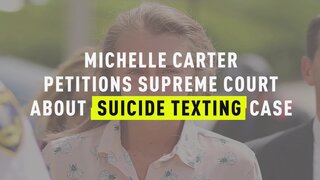Create a free profile to get unlimited access to exclusive videos, breaking news, sweepstakes, and more!
Michelle Carter's Defense Wants To Bring Her Suicide Texting Case To Supreme Court
Michelle Carter was convicted of involuntary manslaughter for encouraging Conrad Roy III to kill himself in 2014 and her lawyers say that judgment has set a "dangerous precedent" that compromises the right to free speech and due process.

The defense team for Michelle Carter, the now-infamous woman who was convicted of manslaughter for encouraging her boyfriend to commit suicide over text, is trying to bring her case to the Supreme Court.
Carter’s boyfriend Conrad Roy III died by suicide in 2014 at the age of 18 after he filled up his truck with carbon monoxide while sitting in a K-mart parking lot. After his death, it was revealed through text message history that Carter, then 17, encouraged him to go through with the act. For days before his suicide, she sent him numerous pro-suicide texts, which were used in court and led to her involuntary manslaughter conviction in 2017. She was sentenced to 15 months behind bars, which she is currently serving. The conviction was brought to Massachusetts' highest court earlier this year, where it was upheld.
Now, her lawyers want to bring it to the Supreme Court, where they hope her conviction will be reviewed and vacated.
In a petition filed Monday, Carter’s defense claims that her conviction violated both her First Amendment right to free speech and her Fifth Amendment right to due process.
“Michelle Carter’s conviction for involuntary manslaughter in connection with Conrad Roy III’s suicide is unprecedented,” the petition states. “Massachusetts is the only state to have affirmed the conviction of a physically absent defendant who encouraged another person to commit suicide with words alone. Before this case, no state had interpreted its common law or enacted an assisted suicide statute to criminalize such ‘pure speech,’ and no other defendant had been convicted for encouraging another person to take his own life where the defendant neither provided the actual means of death nor physically participated in the suicide.”
HBO's new documentary, "I Love You, Now Die: The Commonwealth v. Michelle Carter," chronicles the case and raises questions about the nature of the teens’ relationship and Carter’s conviction. In the doc, Carter’s lawyer, Joseph Cataldo argues "there's no law that criminalizes encouragement of suicide in Massachusetts and now the district attorney's office says even though our legislature has not criminalized that behavior with the law, we’re going to prosecute her with a homicide.”
He says in the documentary that the idea that one’s words can lead to a manslaughter charge sets a “dangerous precedent."
Daniel Marx, another attorney for Carter, said in a statement Monday that her conviction violated due process because “the vague common law of involuntary manslaughter fails to provide guidance to prevent arbitrary and discriminatory enforcement in morally fraught cases involving suicide.”


























